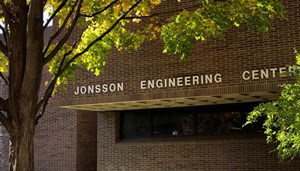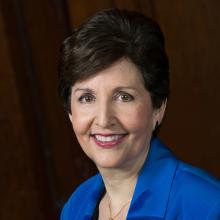
On Career Paths, the RPI Ratio, and Having Fun
Tell us a bit about yourself, where you grew up and attended school.
I was born in Oak Ridge, Tennesee, attended kindergarten at the two-room public school in the village of Streatly on the Thames, England, and went back to Oak Ridge for the next two years. My Dad, Robert Block, was invited to RPI to do research at the linear accelerator when I was in third grade. At the end of the year, he was offered a full professorship in the nuclear engineering department, which he accepted. So, I did most of my growing up in the New York Capital Region of Albany, Schenectady, and Troy. I’m a graduate of Niskayuna High School, a suburb of Schenectady. I had the wonderful experience of being a Rotary Exchange Student to Cochabamba, Bolivia, my junior year of high school. During that year not only did I visit several areas of Bolivia, but also Peru, Ecuador, and Colombia.
What led you to pursue an engineering degree at Rensselaer? Your father, Prof. Robert Block, was a nuclear engineering faculty member at Rensselaer. Did this impact your decision?
When I was in Bolivia my junior year of high school, I had a boyfriend who was from England. His parents lived in a historic home that could not have its exterior modified, including additions. But his mother wanted a sewing room and was looking into converting the triangular attic space into a room for her. I came up with a design and my boyfriend said, “you should be an architect.”
When I got back home, I took an aptitude test and found out that my strengths were in math, science, and art. Based on these results, I considered three different career paths: engineering, architecture, and orthodontics. Why I was considering orthodontics would take another whole paragraph but think about it, it deals with design, forces, and construction (installing braces). I decided on architecture and RPI. The main reason for choosing RPI was because of money. With my dad being faculty, tuition was free at RPI or I would receive half of RPI’s tuition for any other school. I didn’t see how any of the other schools I applied to were worth the extra money, and no matter what my dad says, it wasn’t because he promised a car if I went to RPI! Getting a stripped eight-year-old American Rambler that needed body work and new upholstery was great for transportation, but not much of a bribe. But isn’t it amazing how money is a factor in so many decisions one makes in life?
During our sophomore year, due to a recession, we heard stories that it may be difficult to get a job in architecture. So, my friends got together and we brainstormed ways we could make ourselves more employable after college. We just had a structures course as part of our architecture program and I enjoyed it. So, I asked, “How can I double major in architecture and civil engineering with a focus on building structures?” Even though I did not start engineering until I was a junior, this ask led me to graduate with a four-year degree from the School of Architecture as well as a B.S. in Civil Engineering. Remember the three career paths I was considering: engineering, architecture, and orthodontics? I always say, two out of three ain’t bad!
You asked whether my dad being a nuclear engineer had any impact on my decision to pursue an engineering degree. Well, you may realize how many people don’t know what engineering is all about and especially that there are different types of engineers. I’m embarrassed to say that even though I grew up with an engineer, I didn’t realize there were different types of engineers until I attended RPI. But in my defense, I always considered my dad to be a nuclear physicist, not an engineer. I remember I once asked him which one he was and he told me he was both, it just depended on what type of work he was doing at the time. So, the simple answer is my dad’s influence on my decision was through osmosis, not directly.
What was your Rensselaer experience like in general and as a female during the changing times of the late 1970s when the RPI female population was smaller?
My freshman year, the ratio of men to women students for the entire Institute was 10 to 1. When my husband, Christopher Kemper, who is seven years older than me, was a freshman the ratio was 26 to 1, so RPI was succeeding in attracting more women when I started.
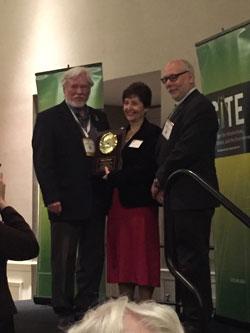
Good or bad, I can be sometimes be oblivious to the currents around me when I’m focused on my goals. We had a professor in our first-year architecture design studio who did not believe in women being architects. I had no idea and only found out about it during my sophomore year when we were in our second-year design studio and my fellow students were talking about it.
Also, in my junior year when I had started to double major in architecture and civil engineering, I was walking in the Greene Building (School of Architecture) and passed the Assistant Dean of Engineering who asked, “How is our little traitor doing today?” I didn’t think anything of it but others pointed out to me how it showed the lack of acceptance between architects and engineers, which unfortunately still holds true today in some circles.
As far as being a woman, one thing I remember freshman year is a fellow student saying “hi” to me so I said “hi” back without having a clue who he was. It seems since there were so few women, even though we didn’t necessarily know all the men in our classes, they knew who we were. I always sat in front of the class so I could see better, and one day I turned around in my calculus class, and there he was. Mystery solved!
We didn’t have any gym requirements like the men did because there were no proper facilities for women. The first sorority was formed on campus during my undergraduate days and I could have been a founding member. But I never did, nor still do, consider myself a woman engineer. I’ve always considered myself to be an engineer who happens to be a woman. I’ve never joined women groups such as a sorority or SWE (the Society of Women Engineers).
Is there a specific memory from your RPI days that you wish to share?
I have many memories of my time at RPI and some are mentioned above. But one specific memory that I’d like to share is more of a lasting impression, dare I say a feeling, as opposed to a specific memory. I don’t remember where, I don’t remember when, and it may have been after a few encounters, but it has to do with my respect for President George Low. George Low became RPI’s president my sophomore year. He was out and about all over campus meeting, greeting, and, most importantly, listening to the RPI community. He was always approachable and many of us, including myself, loved him as our president and felt he was the best president ever.
How did Rensselaer prepare you for success? What do you think distinguishes Rensselaer?
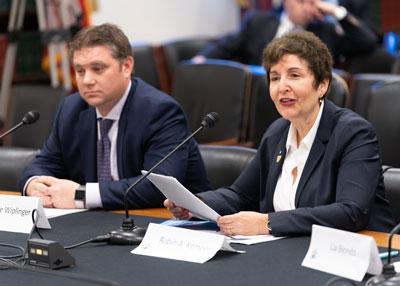
Rensselaer prepared me for my success by giving me the tools and education I needed to have a career as a structural engineer and being involved in ASCE (American Society of Civil Engineers) as a student member. I was given the freedom and support to create my own program when I decided to double major in architecture and civil engineering. And I was given the opportunity to co-chair the ASCE student conference when I was a graduate student, which started me on my path of leadership in ASCE.
At first, I purposely did not get involved in extra-curricular activities like I did in high school because I wanted to concentrate on my studies. I must have been crazy, but in my junior year, the year I started studying both architecture and engineering, I got involved in RPI Players and the RPI Scuba Club. And this was also key to my success because I met my husband, Christopher (Chris) Kemper, at RPI Players. Without his continued support and love, I would not have achieved all I have over the years.
RPI has the advantage of being a small, private school. There is less red tape and protocols than what can be found in larger institutions, especially at public universities, which can allow more flexibility for students to follow their own paths.
Tell us about your career path/journey? What were the challenges and what part of the path did you enjoy the most?
I started my career in Louisville, Kentucky, at Bechtel. My husband was studying for his Ph.D. at the University of Louisville in pharmacology and toxicology. My first bump in the road was 18 months into my first full-time job, and marriage, when the U.S. economy went into recession. The only way I could keep my job was to take a temporary assignment in Midland, Michigan. I spent a year in Michigan while my husband was in Kentucky. Other than for vacation, we typically only saw each other one weekend a month. When I got back to Louisville, I was immediately laid off, and the only game in town was the U.S. Army Corps of Engineers, where I worked for six months before our first daughter was born. After that we moved to New Jersey because Chris had finished his Ph.D. and got an offer from a pharmaceutical company to do pharmacokinetics or drug metabolism research.
In New Jersey, I finally got my dream job, working for a structural engineering consulting firm doing structural design for buildings. But after several years and the birth of our second daughter, there was my next challenge. Guess what? Another recession! After being cut back to a four-day work week which equates to a 20% cut in pay, we merged with a multidiscipline engineering consulting firm and became their building design structural engineering department. Being a project manager on multidiscipline design projects was a great learning opportunity and helped me develop new skills as I learned more about the other civil engineering subdisciplines and mechanical, electrical, and plumbing building design.
After 20 years, guess what? You got it, another recession and layoff and I landed at a forensic engineering company located in Texas, but I worked out of my house. Most of my work was doing site visits of buildings that were damaged by Superstorm Sandy and writing reports. After 14 months and another layoff, Chris said I needed to find a company that would support me in my aspiration to be President of ASCE.
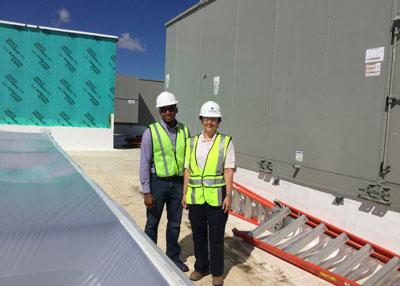
This is where my current employer Zurich North America, the insurance company, comes in. Who would have thought that insurance companies employ engineers? I’m a senior risk engineer in the construction group that mainly deals with projects covered by builders’ risk (insurance for damage during construction) insurance and professional liability insurance. Work includes looking at potential risks on projects, performing site visits to help reduce risks, and providing technical insight if there is an insurance claim. As my colleague says (so I’ve stolen his line), I get paid to give my opinion. All the risk engineers work from home; therefore, when the world shutdown during COVID-19, there was no change in how we worked.
I have never felt more appreciated and supported in my career than I do working for Zurich. Not only do I do my “regular” job, but I’m the lead person in the construction group driving sustainability initiatives.
Tell us about your experiences and leadership at the American Society of Civil Engineers (ASCE).
ASCE has truly made me who I am. There have been several times in my career where my volunteer work at ASCE has kept me going and happy to stay in the engineering profession. It was ASCE who got me started in sustainability, and through my friendships and connections, helped me get three of my jobs.
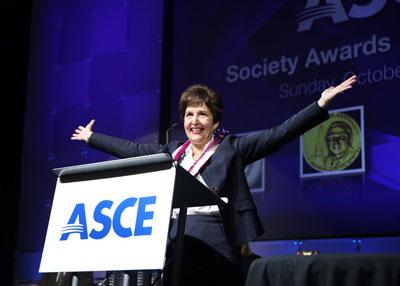
Being a presidential officer of ASCE was an incredible honor and amazing experience. As President-Elect, I crisscrossed the country multiple times meeting with ASCE students, younger members, members, and attending conferences. I visited 14 countries (including the U.S. and Canada) the year I was President. And the year I was Past President was when we were locked down due to COVID-19. I was actually more active than if we weren’t locked down because I was able to participate in more meetings and conferences because they were virtual. Many times I was asked what did I enjoy most, and I would say it was the people. Everywhere I went I made new friends, and learned about their hopes and dreams. I never considered myself a role model but if you are a leader, by default you are one. It is an incredibly humbling experience when someone comes up to you after you spoke and tells you that you were an inspiration to them.
And being a President-Emeriti of ASCE is the gift that keeps on giving. Last year I accepted 24 invitations to speak, and would you believe I got paid or partially funded for several of them? My wonderful company Zurich supports me in these efforts.
Last March, I was invited to be a panelist at a one-day conference on Coastal Resilience being co-sponsored by the Foundation Prince Albert II de Monaco. The prince himself showed up for the last session, and I was sitting directly behind him, two rows back. At the end, the prince got up and said he would take a photo with all the speakers up on stage. Never in my wildest dreams did I ever imagine that I would have my photo taken with royalty, especially in my role as an engineer.
How did you become interested in engineering ethics?
Over the years I have attended many ASCE conferences and quite a few of them had sessions on engineering ethics. Then in 2011, I was taking an ethics webinar sponsored by ASCE, and I thought, I can do this! The rest they say is history I have given over 40 presentations on engineering ethics to various engineering groups, at ASCE events, and at colleges.
As President of ASCE, I was able to stand-up a task committee to re-imagine ASCE’s Code of Ethics for the 21st century. The last time it had been reviewed in totality was in the 1970s. After two years of very hard work by the committee, in 2020, the new ASCE Code of Ethics was adopted.
I’m also the Chair of the Technical Committee on Ethical Practices to Reduce Corruption for ACECC (Asian Civil Engineering Coordinating Council.) I recommended ACECC develop its own Code of Ethics and I asked a committee member to develop a draft. After over a year, a guidance document called ACECC Code of Ethics Guidance was adopted this past September in Goa, India.
What do you do for fun? Hobbies? Favorite books, blogs, podcasts? Travel destinations?
My guilty pleasures include playing Sudoku, Solitaire, and recently puzzles on my iPad. I love puzzles but we’ve always had a cat, then children, and now grandchildren, and by playing on my iPad I don’t lose any puzzle pieces.
Reading is a part of my life, usually when I first get up in the morning and before going to bed. I haven’t had much time for leisurely reading since I joined Zurich, because there are four or more magazines I read a month that are related to engineering and my work. I also read several books a year on the professional side of our profession such as books on leadership, ethics, business, and management. Many of the books I read I hear about when attending a conference or are highlighted in one of the magazines I read. But given the opportunity, my favorite reading genres are fantasy, science fiction, and yes, romance. Some of my favorite authors are David Eddings, Anne McCaffrey, and Julie Garwood. In fact, when I started studying engineering I had to take differential equations and a fellow Burdett resident, a graduate student in math, was helping me. He gave me my first Anne McCaffrey book because it was about a young girl living on the world called Pern who was extremely talented in a traditional man’s role. There were also dragons and fire lizards in the book; I’ve always loved dragons, and I was hooked from that moment on reading the rest of the books about Pern.
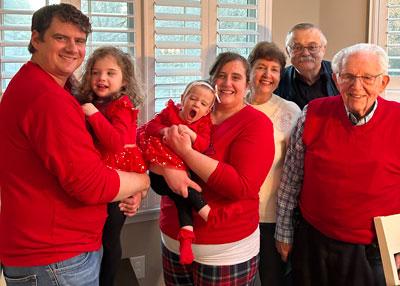
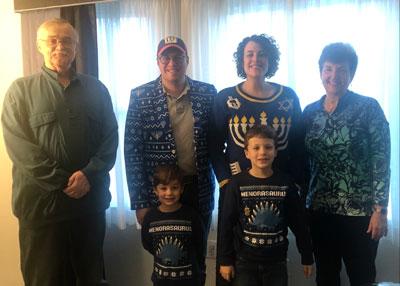
Our go-to family vacation is a seashore vacation, on the ocean side, where we can enjoy the waves and body surf. I love to travel and I’ve been incredibly fortunate to have visited 47 countries and territories (including the U.S.) so far, although three of them were the airports only.
What is your message to current Rensselaer students?
Over time, especially after serving three years as a presidential officer of ASCE, I have developed some philosophies or sayings with respect to life and how to set yourself up for success.
- No one will care more about you and your career than you will.
- It’s all about the ask. You need to ask for what you want, and when asked to do something you need to say “yes” whenever possible.
- After the “ask,” it’s all about relationships. Whether it is technical, professional, or personal, you must have good relationships to be successful.
- You never know where this wonderful life will lead you. You need to open your mind to the possibilities you will encounter.
- And on a T-shirt that my cousin out in California made me buy and I use as a prop in some of my presentations, “Never underestimate an old Woman who graduated from RPI.”
Finally, my three most important thoughts are:
- Go out there and learn things!
- Make new friends for life!
- And most importantly, and I mean most importantly, if you don’t remember anything you read in this article remember this, Have fun!!!
